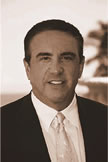 Home: PCU
3|2003: Home: PCU
3|2003:
 |
Editor’s Note
|
|
| Correspondence
from the Front Line |

Dear Dr Washington:
Nothing brightens my day more than a supportive e-mail from a
listener of our audio series, and I was particularly touched by
your words. Having spent the last 15 years “grilling” cancer
research leaders about how they manage patients in their clinical
practice, I have become accustomed to the discomfort they often
express when recounting therapeutic dilemmas that do not always
have a correct answer. I’m glad these perspectives are reassuring
to you, and I hope the insights of research leaders about what
to expect from future research leaves you and the rest of our listeners
optimistic for the future.
In terms of “issues that perplex everyday practitioners,” you
may wish to review the enclosed interview with Dr Paul Schellhammer — our
first interviewee when we launched this series last year. Dr Schellhammer,
a nationally recognized prostate cancer research leader, recounted
his own personal challenging experience with radical prostatectomy
(including the rare complication of a psoas abscess). At that time,
he was also struggling with the knowledge that his PSA was rising.
In the enclosed follow-up interview, he recounts his decision to
be treated with pelvic radiotherapy and eight months of combined
androgen blockade.
Your note mentions that this is an “increasingly complex
disease,” and, as demonstrated by Dr Shellhammer’s
dilemma, the emergence of PSA testing as a means to follow men
treated with radical prostatectomy and radiation therapy has left
clinicians with an important subpopulation of patients for whom
there is minimal clinical research data available to guide decisions.
Dr Shellhammer’s personal experience with prolonged severe
gastrointestinal toxicity from radiation therapy also highlights
the limitations associated with clinical research data, which would
have predicted relatively minimal side effects.
In his unique understated manner, Paul notes, “As a physician
and scientist, it is interesting to experience the reality of what
you read about.” He also describes the mixed emotions experienced
by many patients when completing therapy — relieved that
it’s over, but concerned about the permanence of the treatment’s
benefits.
As you stated, every physician who provides care for prostate
cancer patients struggles with challenging issues like the management
of biochemical recurrence in men. I hope that this audio series
is helpful in thinking through these challenging situations.
Sincerely,
Neil Love, MD
P.S. In terms of being on the Prostate Cancer Update mailing
list, our educational grant allows us to distribute the audio
series without charge to all U.S.-based urologists and radiation
oncologists. If you know of any of your colleagues who are not
receiving the series but might be interested in it, please let
me know and I will add their names to our subscription list.
|